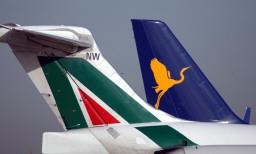The flight operations of Italy's bankrupt national carrier officially changed hands on Friday when it was sold to Compagnia Aerea Italiana (CAI), a group of private Italian investors created to launch a new Italian national airline.
Although the sale represented a break with the carrier's state-controlled past, CAI Chairman Roberto Colaninno said the new national airline will continue to be called Alitalia.
''Today an official act was signed transferring the carrier's assets to CAI and although we can only formally use the name Alitalia starting January 12, I will start using it as of today because I prefer it to CAI,'' Colaninno said.
January 12 is the date set for the passage from the old state carrier to the new private national airline.
Before the new airline officially takes off CAI will merge its Alitalia assets with those of Italy's biggest private airline Air One, controlled by CAI partner Carlo Toto, which it formally acquired on Thursday.
A decision is also expected on CAI's strategic foreign partner, who many pundits believe will be Air France-KLM.
CAI is paying a total of 1.052 billion euros for Alitalia's flight division which includes assets as well as selective debts, including those for ordering new aircraft.
Speaking to the press after the sale signing ceremony, Colaninno, who is also chairman of Vespa-maker Piaggio, said Alitalia had been bought ''at the right price'' and recalled that this had been verified by the European Union.
The new Alitalia, Colaninno observed, ''will not seek to establish a monopoly (in Italy), nor to impose unjustified price hikes or take business away from our natural rivals. What we will try to do is make it economically possible to offer such a complex service''.
''What we want is a successful company which puts its client at the center of attention,'' he added.
Turning his attention to the new Alitalia's future partner, Colaninno said a decision ''will be made before the end of the year because I'd like to embark on this new adventure with our partner already aboard''.
Also on hand at the press conference was CAI CEO Rocco Sabelli who confirmed that two partnership offers were under consideration, one from Air France-KLM and the other from Germany's Lufthansa.
Both airlines, he said, had presented proposals which were ''structural, commercial and involved industrial cooperation as well as a readiness to make an equity investment''.
Sabelli, who is also CEO at Piaggo, added that ''it will be hard to choose between the two, but we will choose the best offer''.
Looking at Alitalia's future, Sabelli said the mentality behind the old public carrier was ''dead and buried'' and CAI's business plan ''does not seek to downsize but aims at expanding business, carrying more passengers and increasing earnings and investments''.
''One cannot make an airline as big as they want but only as big as is needed. It's much better to have fewer but fuller planes than too many empty ones,'' Sabelli said.
Alitalia's flight division was able to be spun off and sold separately from its loss-making activities thanks to changes made last summer to Italy's bankruptcy laws.
The national carrier's non-flight operations, as well as its over two-billion euro debt, are slated to be sold or liquidated by Alitalia's government-appointed administrator Augusto Fantozzi.
Friday's sale came just hours after two unions representing Alitalia pilots and flight attendants signed a government-mediated accord regarding the hiring of staff from the bankrupt national carrier by the new national airline.
The ANPAV and AVIA unions were the last hold-outs to signing the accord which had already been accepted by Alitalia's seven other unions.
The new airline will initially employee some 12,500 out of the close to 17,000 staff at Alitalia and 3,000 at Air One.
CAI's other partners include Pirelli chief Marco Provera Tronchetti, the Ligresti insurance family, the Benetton family and the Bellavista Caltagirone family, which through its company Acqua Marcia offers handling and maintenance services in five national airports, including Malpensa.
Another founding member is Italy's second-biggest bank, Intesa SanPaolo, which had initially drawn up a rescue plan for Alitalia for the government which later was used as the blueprint for CAI's business plan for a new national carrier.










